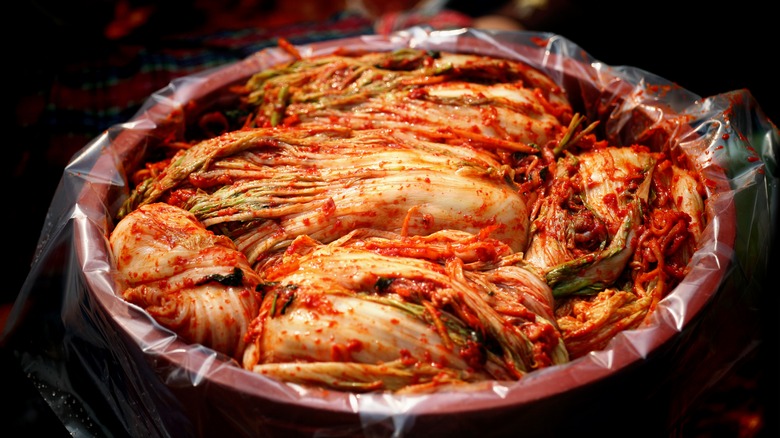How The Olympics Helped Spread The Gospel Of Kimchi
In recent years, Korean cultural exports have ascended to the status of international phenomena, introducing the global community to a rich array of musicians, movies, and television series. Whether you bounce to BTS or get squeamish from "Squid Game," there's something there for everyone. In tandem with this pop culture boom, Korean cuisine has worked its way into American hearts. The proliferation of Korean BBQ spots is rapidly spreading the good word of bulgogi and kalbi ribs throughout the nation, but a strong argument could be made that Korea's most famous food is kimchi.
By now, many Americans will be familiar with kimchi in general, but few are aware of the full range of offerings. The version of kimchi that likely pops into most minds is defined by fermented Napa cabbage and gochugaru chili flakes, but this iteration, known as baechu, is just one of the many types of kimchi you can try. Serious Eats elaborates on the cultural significance of kimchi, traditionally prepared as a communal activity called kimjang.
These days, you can simply buy kimchi at your local H Mart, but as Serious Eats explains, kimjang remained necessary for Korean immigrants in the U.S. for decades, as you couldn't find kimchi at any market. That fact changed rather suddenly when South Korea took the spotlight in the world's largest international event.
Kimchi was an official food of the 1988 Olympics
When Seoul got the chance to host the Summer Olympics in 1988, it marked a tremendous shift in the nation's international image. As the International Olympic Committee (IOC) points out, Korea's reputation prior to the games was deeply enmeshed in the Korean War. The games became a massive cultural showcase wherein kimchi seemed like an obvious thing to celebrate, but the event's organizers were hesitant at first.
According to Smithsonian Magazine, Olympic officials agreed to make kimchi one of the official foods of the Olympic Village, but they worried that foreign visitors would not be able to handle the smell. So great was their concern, that event staff were instructed to thoroughly brush their teeth after any time they ate kimchi. However, these fears were dismissed once guests actually arrived and sampled the dish.
Some of the first foreign nationals to sample kimchi were the athletes residing at the Olympic Village, who gave it positive press exposure. Word of kimchi reached the ears of Elaine Louie, an American reporter on site for the games, and she included it in a profile of Korean cuisine for The New York Times. That sealed the deal. According to Smithsonian Magazine, exports of kimchi skyrocketed in the immediate wake of the '88 Olympics. Kimchi became a celebrity in the culinary world, a lofty status that it retains to this day.

